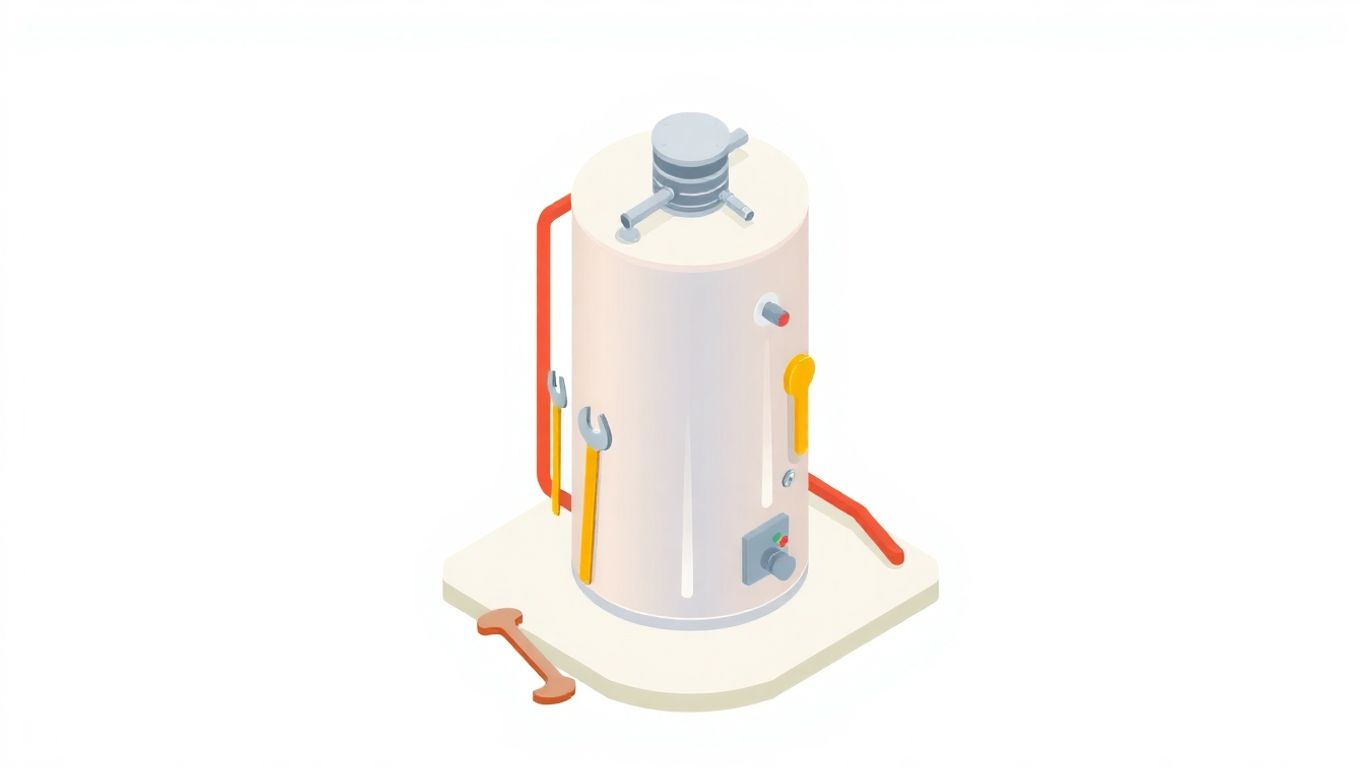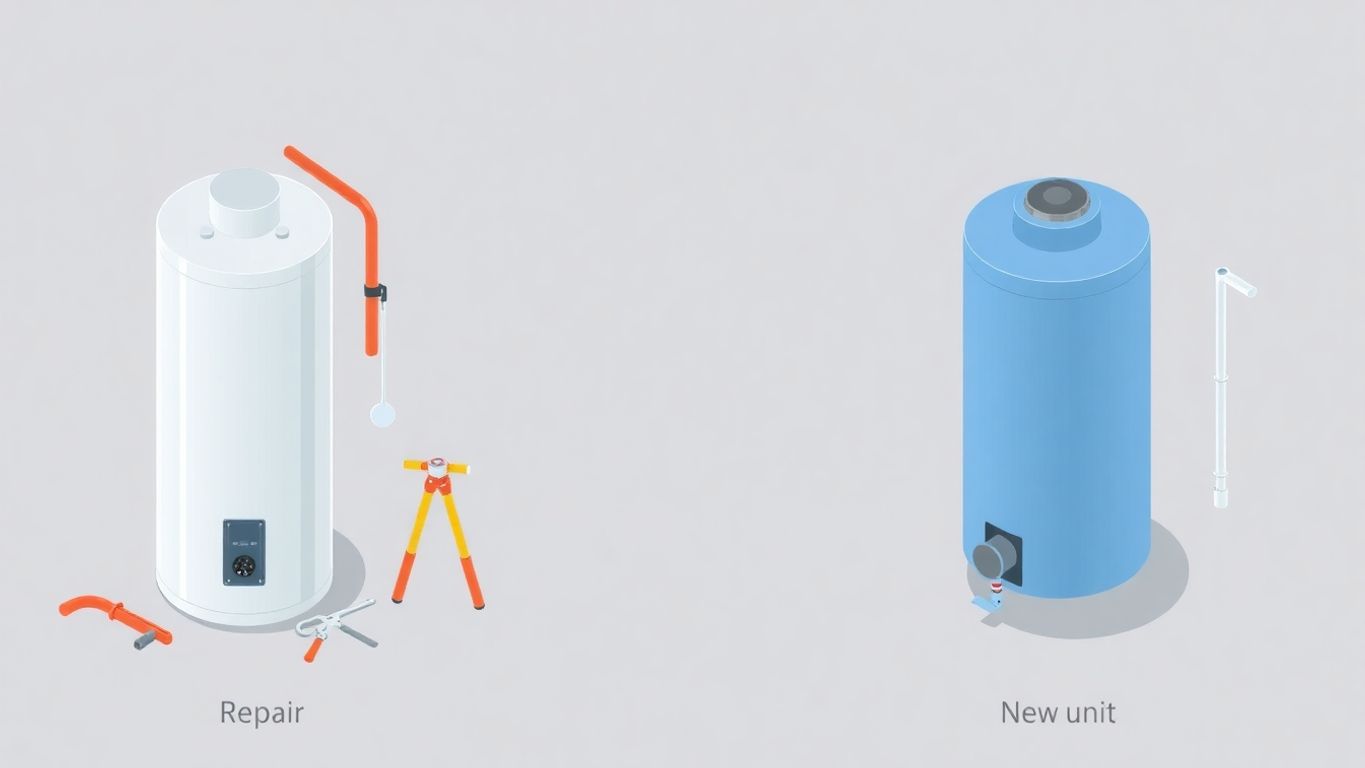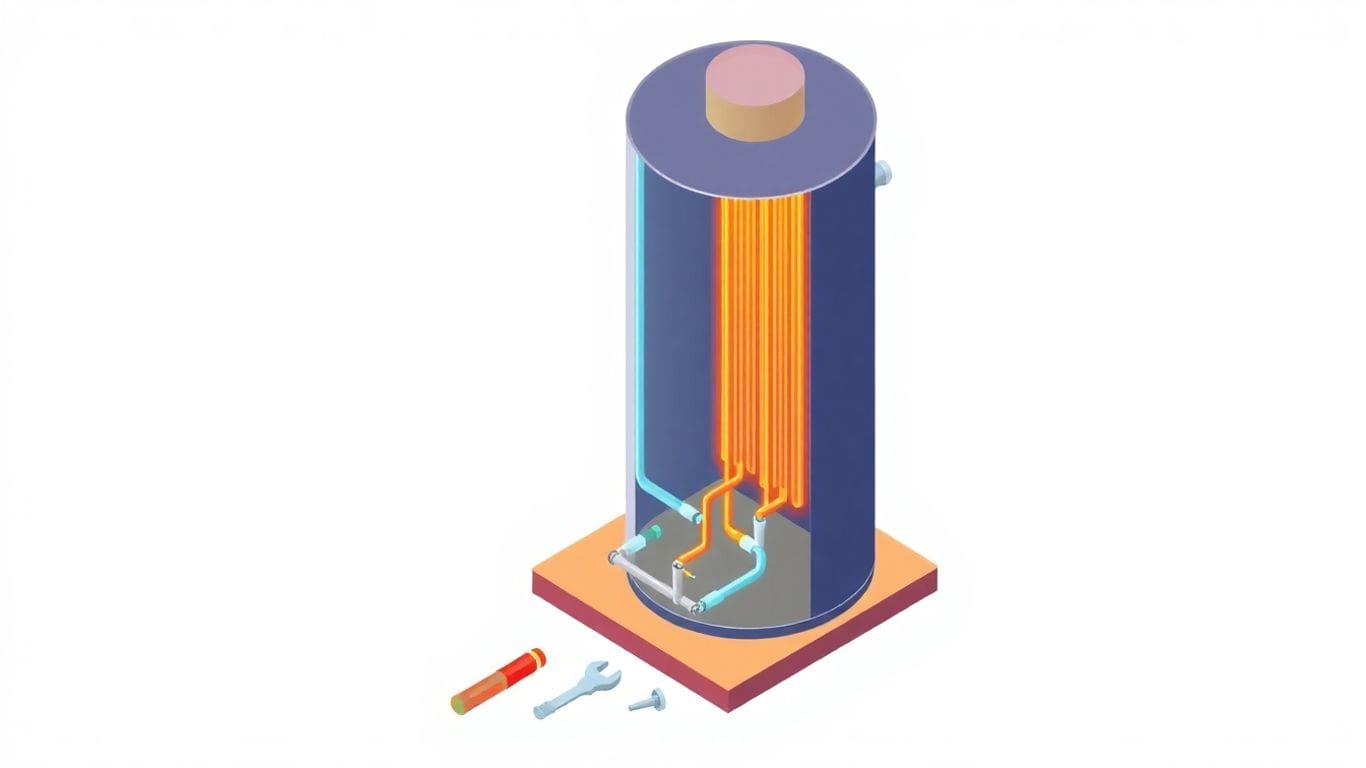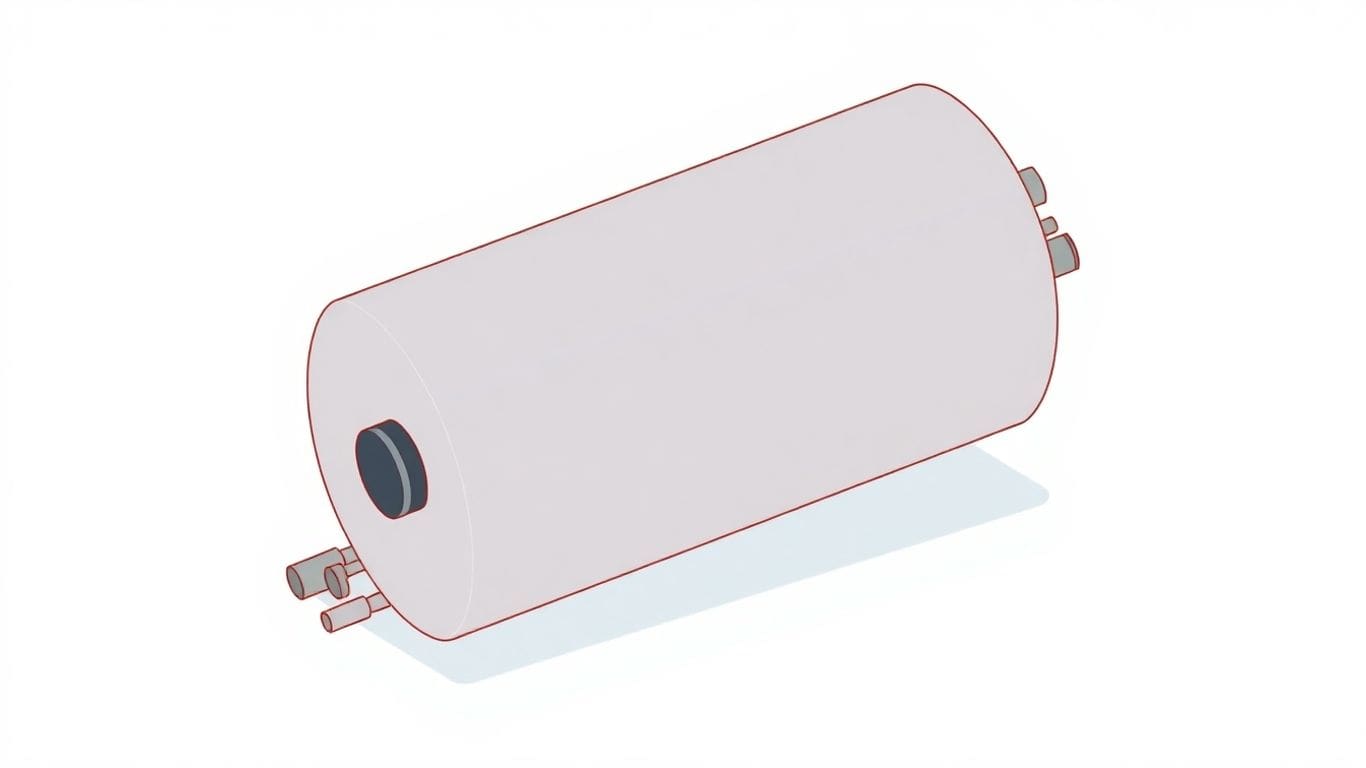Ever had that moment when your shower suddenly turns icy cold? Or maybe your water heater starts making noises that sound like it’s haunted? Yeah, been there. Water heaters are one of those things you don’t think about until they stop working. Then it’s a big deal. So, when your trusty heater starts acting up, you have to decide: should I repair or replace my water heater? Let’s break it down so you can make the right call.
When you’re thinking about water heaters, it’s good to know the different types. There are four main kinds: tank, tankless, heat pump, and solar.
Water heaters might seem complicated, but they’re pretty straightforward. They heat water using either electricity, gas, or solar power.
Like any appliance, water heaters can have issues. Knowing what these are can help you decide if you need a repair or replacement.
Remember, regular maintenance can prevent many of these problems and keep your water heater running smoothly.
Ever hear strange sounds from your water heater? Popping, banging, or crackling noises are not normal. These sounds often mean there’s a buildup of minerals inside the tank. When water heats, it creates steam that gets trapped under these deposits, causing the noise. If left unchecked, this can lead to more serious issues.
Does your shower switch from hot to cold unexpectedly? This is a sign that something isn’t right. It might be a broken thermostat or a faulty heating element. Sometimes, mineral deposits can cover the heating elements, causing them to work less efficiently. Inconsistent water temperature is a sign you shouldn’t ignore.
If the water coming out of your taps is rusty or cloudy, your water heater might be the culprit. This discoloration often means there’s corrosion inside the tank. Over time, the tank’s lining can wear away, allowing rust to mix with your water. It’s a clear sign that you need to check your water heater soon.
It’s always better to fix small problems before they become big ones. Regular checks can save you from a lot of hassle and expense later on.
If your water heater is 15 years old, it’s crucial to assess its condition. Signs of aging include rust, leaks, and strange noises, indicating it may need replacement. Upgrading can enhance energy efficiency and reduce costs. Consider the right size and type for your home, and plan for installation. Regular maintenance is essential for longevity. Delaying replacement can lead to higher repair costs and safety risks. Being proactive can save money and ensure reliable hot water.
Most water heaters last about 10 to 15 years. If yours is getting up there in age, it might be time to think about a new one. Older models can start having more problems, and fixing them might not be worth it. A new water heater can save you money in the long run.
Are you calling the repairman a lot? If your water heater keeps breaking down, it might be a sign that it’s time for a replacement. Constant repairs can add up and become more expensive than just getting a new unit. Here are some things to watch for:
Old water heaters might not be as safe as the new ones. They might not meet today’s safety standards. Look out for these issues:
If your water heater has any of these problems, it’s better to be safe and replace it. Your family’s safety comes first!
Replacing your water heater might seem like a big step, but it can bring peace of mind and even save you money on energy bills. Plus, new models are more energy-efficient, which is good for the environment.
When your water heater acts up, the first thought is usually to fix it. Repairing can be cheaper and quicker. You get back to hot showers and clean dishes faster. But sometimes, repairs only solve the problem for a short time. If your heater keeps breaking down, those repair bills can add up fast.
Consider the age of your water heater too. A unit over ten years old might not be worth fixing. Older models often need more repairs and might not be as efficient. Older water heaters can have issues like decreased hot water supply and strange noises. Upgrading to a new model could save you money in the long run.
Replacing a water heater is a big decision. It costs more than a repair upfront, but it might be the smarter choice. Newer models are more energy-efficient, which means lower utility bills. Plus, they come with warranties that cover repairs for a few years.
Here’s a simple breakdown of costs:
| Item | Cost Range |
|---|---|
| Repair | $100 – $500 |
| Replacement | $1,000 – $3,500 |
These are just estimates. Prices can vary based on the type of water heater and where you live.
The 50% rule is a handy guideline. If the repair costs are more than half the price of a new water heater, it’s usually better to replace it. This way, you avoid spending a lot on a unit that might still give you trouble.
Think of it like an old car. You wouldn’t put a brand-new engine in a car that’s ready for the junkyard. The same goes for water heaters. If it’s breaking down a lot and nearing the end of its life, replacing it might be the best call.
In the end, deciding to repair or replace your water heater is about weighing costs and benefits. Look at how old your unit is, how often it needs fixing, and what your budget allows. A new water heater might be a bigger investment now, but it could save you money and headaches later on.
Switching to a new water heater can be a smart move. Modern heaters use less energy, which means lower bills for you. They heat water faster and keep it hot longer. This is because they have better insulation and smart controls.
Choosing an energy-efficient water heater is also good for the planet. It means less pollution because it uses less fuel. This helps cut down on harmful gases that hurt the Earth.
Investing in an energy-efficient water heater might cost more upfront, but it pays off over time. You’ll notice smaller utility bills each month. Plus, it can last longer, needing fewer repairs.
"Spending a bit more now on an efficient model means saving a lot later."
When it comes to water heaters, you’ve got two main types to think about: tankless and traditional. Tankless water heaters heat water on demand. This means you won’t run out of hot water, but they can be a bit pricier upfront. Traditional water heaters have a big tank that stores hot water, so they’re cheaper to buy but might cost more in energy bills. Think about how much hot water your family uses and what fits your budget.
Every home is different, and so is the amount of hot water it uses. If you’ve got a big family, you might need a larger water heater or even more than one. Make a list of when you use hot water the most. Is it in the morning when everyone’s getting ready, or in the evening when you’re doing dishes and laundry? This will help you figure out what size and type of water heater you need.
There are some cool new water heaters out there with fancy features. Some have smart controls that let you adjust settings from your phone. Others are super energy-efficient, which can save you money in the long run. Look into options like solar water heaters or heat pump water heaters if you want to go green. They might cost more at first, but they can lower your bills over time.
Choosing the right water heater can seem tricky, but it’s all about matching the heater to your home’s needs. Take your time to consider all the options and think about what’s most important for your family.
Getting a professional to check your water heater can save you a lot of trouble. They know what to look for and can spot problems before they get worse. Regular inspections can prevent big issues, like leaks or total breakdowns. Plus, they ensure everything is running safely.
When your water heater acts up, finding the right person to fix it is important. Look for technicians with good reviews and lots of experience. A reliable technician will explain what’s wrong in simple terms and offer cost-effective solutions. You can trust them to handle repairs safely and efficiently.
Keeping your water heater in top shape means scheduling regular check-ups. This might include flushing the tank or checking the thermostat. Regular maintenance helps your heater last longer and work better. It’s like going to the doctor for a check-up, but for your water heater.
Hiring a professional not only saves you time but also gives you peace of mind. You can focus on other things while experts handle the hard stuff.
Remember, when a water heater stops heating, it’s a sign to call in the experts. They can help with everything from strange noises to inconsistent water temperatures. Don’t wait for a small issue to turn into a big problem. Regular professional help keeps your water heater running smoothly and safely.

Taking care of your water heater can help it last longer and work better. Regular maintenance is key to avoiding big problems down the road. Here are some simple tips you can follow to keep your water heater in top shape.
Over time, minerals and dirt can build up in your water heater tank. This can make your heater work harder and use more energy. Flushing the tank helps get rid of this sediment. Here’s how you can do it:
Doing this once a year can help your heater run more smoothly.
Insulating your water pipes can help keep the water hot as it travels to your faucets. This means your water heater doesn’t have to work as hard, saving you energy and money. You can buy pipe insulation at most hardware stores. Simply wrap it around the pipes, especially those in cold areas like basements or garages.
Your water heater’s thermostat controls how hot the water gets. Checking it regularly can help you make sure it’s set to the right temperature. Most experts recommend keeping it at about 120 degrees Fahrenheit. This temperature is hot enough for most uses but not so hot that it wastes energy or risks burns.
By keeping your water heater well-maintained, you can avoid costly repairs and extend its life. Regular checks and simple fixes can make a big difference.
Remember, if you notice any major issues like leaks or strange noises, it might be time to consider replacing your water heater if it’s old or frequently needs repairs. Regular maintenance can help you avoid these problems and keep your water heater running efficiently.

Deciding whether to repair or replace your water heater can be tricky. It’s like choosing between fixing an old car or buying a new one. Here are some things to think about:
Everyone’s situation is different. Some folks have a tight budget, while others can spend more. Here’s how to decide:
Not sure what to do? Ask a pro! An expert can look at your heater and give advice. They know about new models, like tankless options, and can tell you what might save you money in the long run.
"Choosing between repair and replacement isn’t just about today. It’s about making sure you have hot water tomorrow, too."
If your water heater is making strange noises, leaking, or not providing hot water consistently, it might need repair.
Consider replacing your water heater if it’s over 10 years old, requires frequent repairs, or doesn’t meet your hot water needs.
Repairing is usually cheaper in the short term, but if repairs are frequent, replacing might be more cost-effective long-term.
Most water heaters last between 10 to 15 years, depending on the type and maintenance.
Tankless water heaters provide endless hot water, save space, and are generally more energy-efficient.
It’s best to hire a professional to install a water heater to ensure it’s done safely and correctly.
You can make your water heater more efficient by insulating it, lowering the thermostat, and regularly maintaining it.
If your water heater is leaking, turn off the power and water supply, and call a professional for help.


